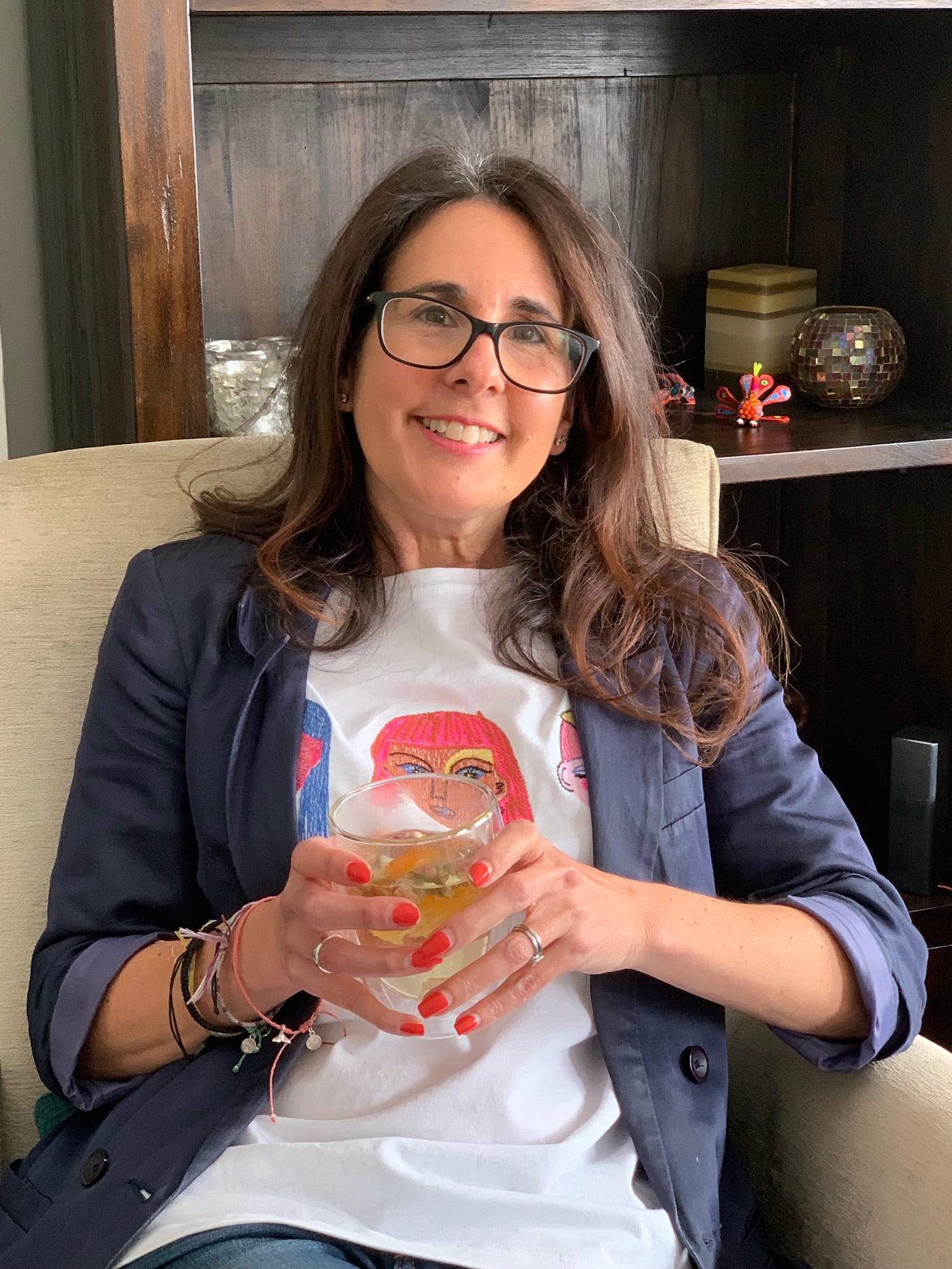How menopause advocates are becoming influencers
Mid-life women are leveraging their menopause experiences to create a public platform that changes the narrative.
Maybe I’m just noticing it more because I’ve been researching and writing about it a lot, particularly when it comes to greater workplace support, but menopause is suddenly everywhere. It’s on the front cover of Stylist magazine and as a double page spread in Stella magazine thanks to a campaign by cosmetics brand Vichy to cater to menopausal skin.
It’s on TV with Davina McCall’s documentary about her own experience, and in the news with celebrities like Lisa Snowdon and Penny Lancaster breaking out of their glamorous personas to candidly address the challenges menopause has brought them. It’s even been one of my most popular newsletter topics to date (thanks to everyone who has joined me so far!)
But I don’t think it is just me. I think menopause is truly emerging from under the rug into the realms of social acceptance, in no small part thanks to the celebrities who are “coming of age” and using their platform to share the frustrations. They’re paving the way for menopause advocates to follow in their footsteps and create a new category of influencer.
What evolves menopause advocates beyond standard influencers is their lived experience that drives their passion for the cause and a genuine desire to take an active role in making change. With an audience of women wanting to know how they can get through what for many will be one of the most challenging times of their lives, menopause advocates are vocal, frank and raw. And where an audience goes and grows, brands follow, making this a space to watch carefully for businesses who want to breathe some real life into their diversity, equality and inclusivity promises.
That’s the topic of my debut report for consumer insights agency Canvas8: “How ladettes of the 90s are taking on menopause”. The report is under paywall, but if you’d like to read it, please DM me.
An increasingly well-known menopause advocate featured in that report is Lesley Salem, founder of menopause support community Over the Bloody Moon. Salem isn’t so keen on the term “influencer”, despite making headlines for being of one of the first people in the UK to go into a secondary schools - a boys’ school at that - to take on the all important task of demystifying menopause for young people, building that awareness and empathy that will hopefully spread into future workplaces to help create more tolerant environments for the mature female workforce.
Salem is the subject of this week’s Q&A, where she discusses separating the science from the fluff, and her upcoming campaign to challenge men all over the country to don a “hot flush vest” and report back on their experience. Can’t wait to hear more about that!
“Suddenly, there’s a conversation that there wasn’t before”: Q&A with Lesley Salem, founder, Over the Bloody Moon
What inspired you to start Over the Bloody Moon?
Lesley Salem (LS): My background actually is in market research, branding and innovation. I’ve spent many years running workshops for corporates, and my market research background has involved listening to what people's unmet needs are and trying to find ways to meet those needs and improve their lives.
So my personal interest and story is that I left my fairly new job because I wasn't handling my menopause experience and symptoms very well. I wasn't even sure that they were, if it was definitely menopause, as it took me six months to work out. And so I set up Over the Bloody Moon, which in some ways was like a manifestation of my own personal journey. And as I was learning I wanted to share that with others, that community of people like me that are going through perimenopause, and the community of menopause advocates, because I really believe it's not about competition in this space. It's about collaboration and the more voices that work together, the louder our voices will be heard. We’re really lucky in the UK. Some people, like Diane Danzebrink, Katie Taylor, Dr. Louise Newson, have been doing this for a very long time, so it's great to be part of that community.
Do you see yourself as an influencer in this space?
LS: I don't like the word influencer as that immediately associates you with commercialisation, and that is not my motivation at all. What I want to do is to make sure that people get the support and the management that they need, and that we remove the stigma and the taboo around menopause. Actually, I started this journey on a fellowship programme at the School for Social Entrepreneurs, because I wanted to create a model that was about giving back, financially as well as emotionally, to create a business model where women weren't having to pay for menopause support themselves, which is why I have gone down the route of corporate training, and we've done some brand sponsorship partnerships with the likes of Procter and Gamble where we were able to reach thousands of women with a live and pre-recorded webinar.
I also don't like the term influencer because it suggests it's one person. Over the Bloody Moon is a collective of mentors, doctors, psychologists, nutritionists, and other different specialists. I also have a whole team of amazing volunteers. I am actually quite hidden.
What’s your approach to brand and corporate partnerships?
LS: For me, it’s about being quite careful about who we partner with, because I believe that it's important to give evidence-based information that's impartial. Part of my personal confusion was there was a lot of branded product content, and it's hard to know whether that’s impartial. The clinical medical information was also not very relatable. So I see myself as taking the clinical science of trusted information, and sharing it in a more digestible, practical way. I also retrained to be a certified health coach and nutritionist which took me over a year because I wanted to also have that credibility and understanding - by coaching, you really get close to hearing the problems that people are experiencing.
Working with brands and corporates, how do you keep yourself on the right side of commercialisation?
LS: There are two parts to what we deliver - education and support. If a brand partner is somebody that has a trusted product that can help, then educating around that is a good thing. There is a limit to the free resources we can offer because we are self-funded, so if there's a way of increasing that reach, so more people have access, the better.
And it's not just women that we target. We are working in an ecosystem. It's not just the people who are impacted directly by menopause that need to develop empathy and understanding of the topic, which is why we've gone into schools. I'm working with the head of wellbeing at one school to develop lesson plans that are going to be affordable for state schools, because there's no toolkit that the Department of Education provides. So I'm looking at where are the gaps, and where's going to have an impact? Well, schools because that's the future generation - they're going to go home, talk to their mum or their aunty about it. And suddenly, there's a conversation where maybe there wasn't, especially in businesses, because it's still taboo. A lot of people are coming to Over the Bloody Moon because they now have joined the dots. We also want to catch younger women who might not be thinking about menopause just yet.
What should potential partners know about working with you?
LS: I'm open to all discussions. The current project I'm working on for International Women's Day on March 8 next year is called the Menopause Project, and I'm looking for sponsors for that. We’re working with a costume designer and fabric technologist to create a hot flush vest. We want to recruit men across the UK, across different socioeconomic groups and types of employment, to wear it for a week and go to work and to report on their experiences. I would very much like brands or companies to approach us to help make that happen, because I think it's going to get a lot of fantastic press.
I think my rules of engagement are just that there needs to be a genuine link as to why they would be of interest and why they personally would be a good fit with the community, and the inclusivity and diversity we represent. We try and be as accessible to as many people as possible and for all types of menopause, so they would have to reflect our values. They need to value the privilege of supporting the Over the Bloody Moon community without selling. It’s about educating and empowering with the right tools. We are having conversations with certain trusted brands that do bring solutions to people that are based on clinical evidence, which is the important thing. Now that brands are starting to act more as citizens with strong corporate social responsibility agendas, it's a lot easier because everybody's talking a similar language.
Are you finding more interest from brands as menopause has become more talked about in the media?
LS: It's still early days. 90% of my time is spent on corporate training and education. The consumer side is only starting to get going. At the moment, our focus is on education, and how we can support people within organisations as well through empowering them. A lot of that is just around adjustments to lifestyle, and recognising what nourishes you, and what doesn't through our coaching tools, and the proven strategies and tips that our specialists share.
But we are very much looking for collaborations with brands. We had a very successful campaign with Always Discreet. This involved the sponsorship of four free one hour virtual Menopause Masterclasses to thousdands of women, and a series of blogs where we brought in a team of menopause doctors and specialists to share their tips and strategies for menopause management. They also collaborated to produce a video for World Menopause Day, portraying a positive take on menopause to support the brand's mission of redefining the narrative around the topic.
It was an amazing experience to bring our clinicians together and give valuable information to women in their late 50s who had been experiencing symptoms for over a decade, yet hadn't had access to such in-depth information. We’ve got lots of ideas of how we can work with brands.
What is the benefit of working with such a targeted specific community that is aligned around this single interest?
LS: There’s a real fandom, support and strong affinity for the Over the Bloody Moon community. We're a genuine community that’s looking for solutions.




